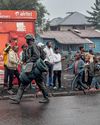
Walz, plucked from relative obscurity when he accepted the vicepresident's offer to join the Democratic presidential ticket, placed his hand over his heart. He waved. He bowed.
He pointed to the crowd, and back to Harris. He grinned and laughed and bowed again.
When it was his turn to speak, Walz turned to Harris: "Thank you, Madam Vice-President, for the trust you put in me but, maybe more so, thank you for bringing back the joy."
It was a remarkable moment in a remarkable election cycle that would have been unimaginable a few weeks ago. But then Joe Biden abandoned his bid for re-election, and Democrats, with unusual speed and certainty, embraced his vice-president as their standard-bearer. Harris's ascendance - and her choice of Walz as a partner have transformed the party.
"All of a sudden, an election that felt like it was slipping away from us, we are now in command," said Simon Rosenberg, a Democratic strategist.
The Philadelphia debut was the first stop of a multi-day, battleground state tour through the Rust belt - Pennsylvania, Wisconsin and Michigan - and the Sun belt - Arizona and Nevada designed to introduce "Coach Walz" and energise Americans for the threemonth sprint to election day.
Along the way, Harris and Walz cast themselves as "joyful warriors".
Unlike Biden's campaign, which had framed the contest as an existential choice between a president who would defend US democracy and a former president who would destroy it, Harris has sought to present the race as a choice between her vision for a "brighter future" and Trump's "backward agenda". At events, crowds chant the campaign's rallying cry: "We're not going back!" "Do we want to live in a country of freedom, of compassion, of rule of law?" Harris said in the rural Wisconsin city of Eau Claire last Wednesday.
This story is from the August 16, 2024 edition of The Guardian Weekly.
Start your 7-day Magzter GOLD free trial to access thousands of curated premium stories, and 9,000+ magazines and newspapers.
Already a subscriber ? Sign In
This story is from the August 16, 2024 edition of The Guardian Weekly.
Start your 7-day Magzter GOLD free trial to access thousands of curated premium stories, and 9,000+ magazines and newspapers.
Already a subscriber? Sign In

What is DEI and why is Trump waging war against it?
When American voters headed to the ballot box in November, opinion polls suggested the cost of living, immigration and reproductive rights ranked among their biggest concerns.

Who are M23 rebels and why is there fighting in eastern DRC?
The armed group M23 and Rwandan soldiers entered the centre of Goma last Sunday after weeks of advancing on the main city in the Democratic Republic of the Congo's North Kivu province.

Aid distribution What Israel's ban on Unrwa may mean for Palestinians
Israel this week insisted it would not back down over its plan to close the Gaza operations of the United Nations Relief and Works Agency for Palestine Refugees (Unrwa), even though critics said the move would jeopardise urgent humanitarian aid efforts.

Anti-terror strategy failed to stop a killer
Southport attacker's lack of coherent ideology meant the Prevent scheme did not see him as a potential risk, exposing the need for reform
Last writes
Handwriting is disappearing - we are far more likely to use our hands to type or swipe than pick up a pen. But in the process are we in danger of losing cognitive skills, sensory experience and a connection to history?

I just want to hug those girls' Bittersweet joy and relief as freed soldiers return home
Nineteen-year-old Naama Levy became an indelible symbol of Hamas’s 7 October 2023 attack on Israel.

Eighty years after the liberation of Auschwitz, survivors call for courage amid the rise of hatred and antisemitism 'We must avoid the mistakes of the 1930s'
On a day of startling blue skies, Auschwitz survivors stood before princes and presidents on Monday to remind the world, perhaps for the final time, of the horrors they suffered there during one of the darkest moments of human history.

Davos lessons Trump's return heralds new era of harsh global competition
In the heady mountain air of Davos last week, away from the parties and the backslapping tech bros, another, more beleaguered crew touted their wares: the multilateralists.

Can the continent's publishing industry turn a page?
Tsitsi Dangarembga's Nervous Conditions, a novel about growing up in colonial Zimbabwe, is one of the most important works of 20th-century African literature and features on university curriculums across the UK.

Trump has arrived with abang-but can he follow through?
Little more than a week ago, Stewart Rhodes was serving an 18-year prison sentence for seditious conspiracy over his role in a deadly attack on the US Capitol.